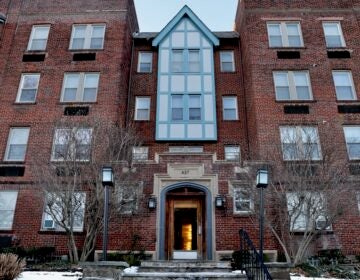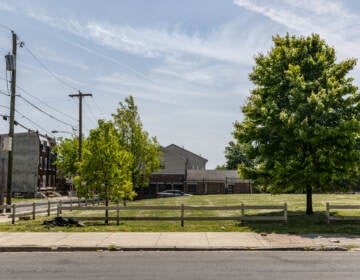Philly historical commission approves new district for Washington Square West
The 9-0 vote came after a meeting that saw property owners express competing opinions about the nomination.
Listen 1:09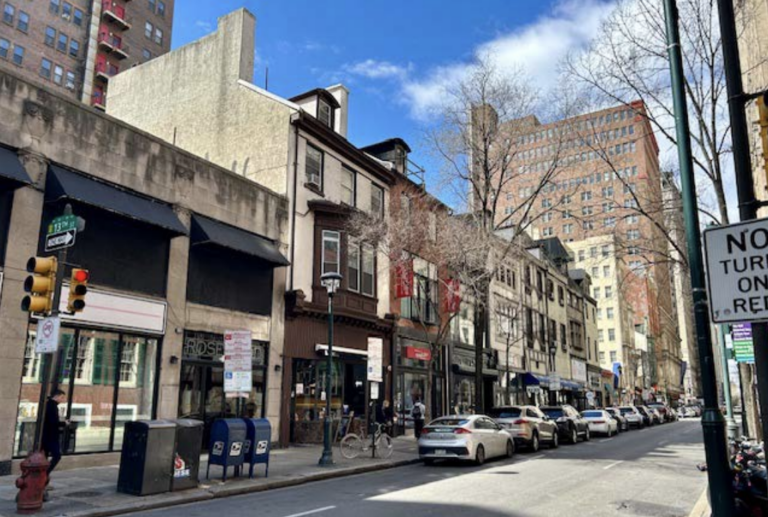
Looking southwest along the 1300 block of Walnut Street. (Philadelphia Historical Commission)
Have a question about Philly’s neighborhoods or the systems that shape them? PlanPhilly reporters want to hear from you! Ask us a question or send us a story idea you think we should cover.
The Philadelphia Historical Commission voted unanimously Friday to create the Washington Square West Historic District, a collection of 1,441 residential, religious and commercial properties spanning more than two centuries — from the colonial era through the mid-1980s.
The new district covers approximately 26 blocks of Center City. The irregularly-shaped area runs roughly between Walnut and Lombard Streets and between 8th and Juniper Streets. The properties were built between 1740 and 1985, a stretch with historical significance to the Jewish, Black and LGBTQ communities of Philadelphia.
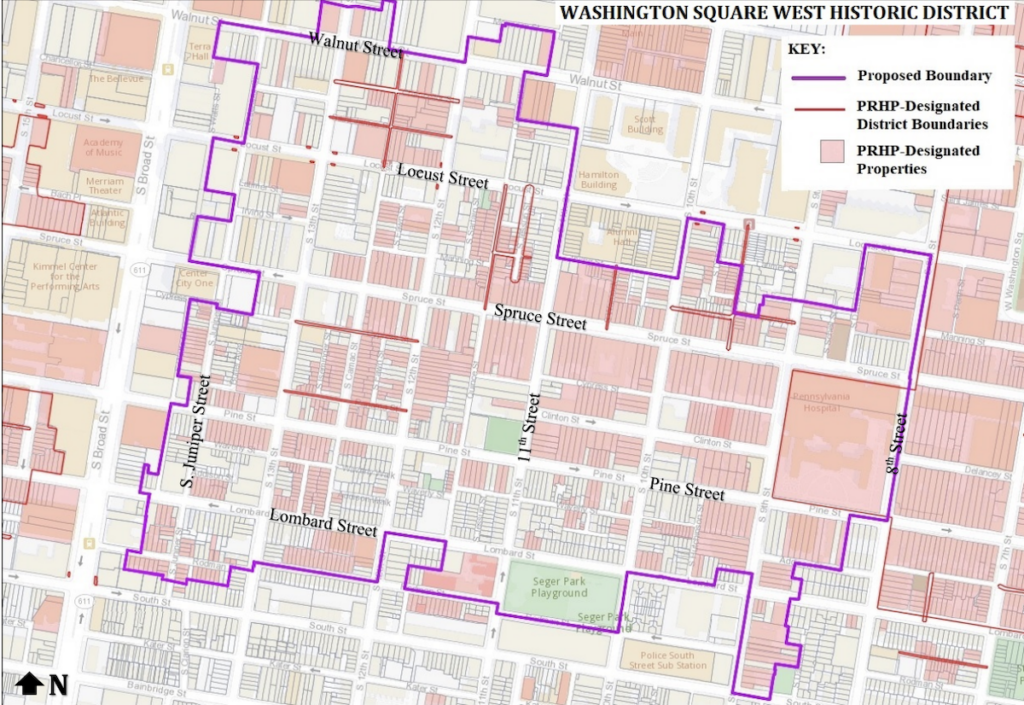
More than half of the properties were already part of the city’s historic register. The list includes Mikveh Israel, a cemetery that’s also a National Historic Landmark, the former home of the American Baptist Publication Society and Giovanni’s Room.
“We believe the ensemble of these different architectural types and the rich variety of Philadelphia’s cultural life this reflects is no better preserved than in Wash West,” said Hanna Stark, director of policy with the Preservation Alliance of Greater Philadelphia, which nominated the district with the Washington Square West Civic Association.
The designation makes it very difficult, but not impossible for properties in the district to be demolished. It also means that property owners will now be required to get approval from the historical commission before making changes to the exterior of their buildings or performing alterations that require a building permit, among other rules.
Friday’s decision followed a spirited meeting rooted in a long-running debate about whether it is appropriate for an historic district to span most of a city neighborhood. In this case, Washington Square West, a mixed-income neighborhood sandwiched between Rittenhouse Square and Society Hill that includes an area known as the Gayborhood.
Opponents urged the commission to reject what they described as a vague and overbroad nomination, saying the district has no unifying history that distinguishes it from any other neighborhood of the city.
“Using a grab bag approach to historical districts used in this nomination one could simply nominate all of Philadelphia and be done with it,” said property owner Joshua Zugarman.
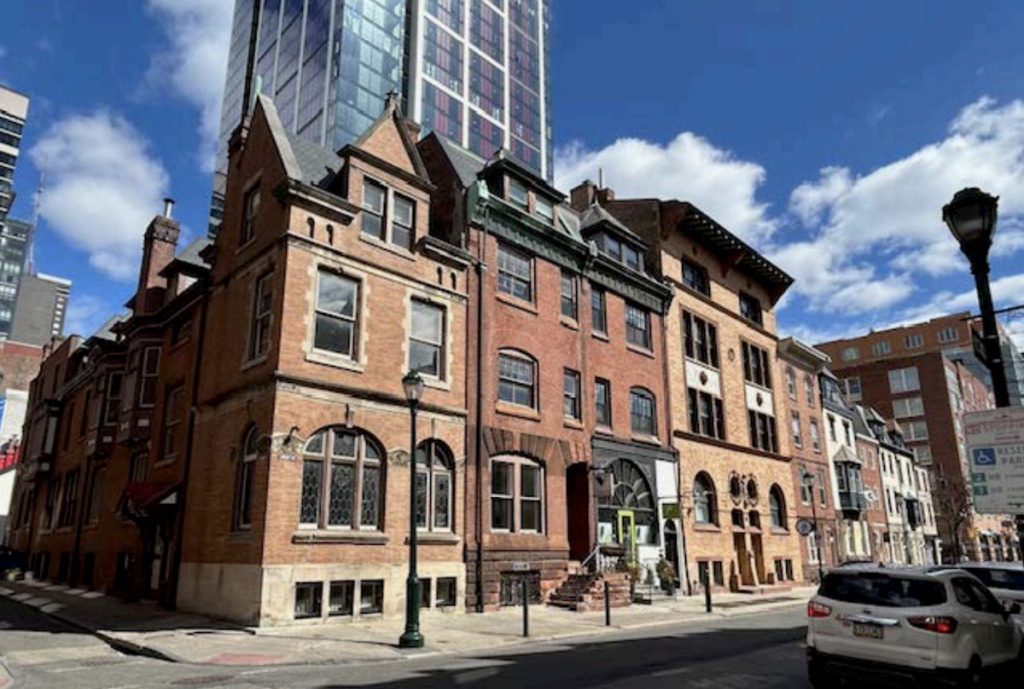
Critics also argued that creating the district would irrevocably alter the bohemian and heterogeneous characteristics of the neighborhood. The neighborhood often draws comparisons to Greenwich Village in New York.
“The fabric of a neighborhood is a term that gets used a lot. But it’s not just the architecture that builds that fabric of a neighborhood but it’s the people who build that fabric. Without our people, we’re not the same,” said Katie Low, a board member of the Washington Square Civic Association.
Proponents pushed back on that idea and argued that a new historic district is the best way to preserve what makes the neighborhood special, including its architectural variety and unique blend of residential and recreational dynamics.
Barbara Arvanitis, who owns a historic trinity in the neighborhood, called her corner of Philadelphia “culturally and visually rich.”
“And to lose its great, great character would be a tragedy,” Arvanitis said.
The historical commission spent little time discussing the nomination before approving the nomination with a 9-0 vote. Only Robert Thomas, who chairs the commission, spoke before the commissioners cast their votes.
He said the district is needed to make sure every piece of the neighborhood is preserved.
“What you can end up with is really something where you have several highly significant buildings and then everything in between is knocked down,” said Thomas.
Before the commission considered the nomination, it rejected a request from property owners to postpone voting on the nomination for a third time. Property owners argued that the commission had not provided enough notice to residents about the potential designation, a claim the commission disagreed with, prompting Friday’s vote.
Before Friday’s meeting, the nomination was discussed at least two dozen times by the Washington Square West Civic Association, the group’s secretary said Friday.
Jon Farnham, executive director of the historical commission, said the government body sent letters to all affected properties and property owners; put up posters in the neighborhood; and advertised the nomination in the newspaper.
“I think we have satisfied the notice requirement to the full extent of the law,” said Farnham.

Get daily updates from WHYY News!
WHYY is your source for fact-based, in-depth journalism and information. As a nonprofit organization, we rely on financial support from readers like you. Please give today.






